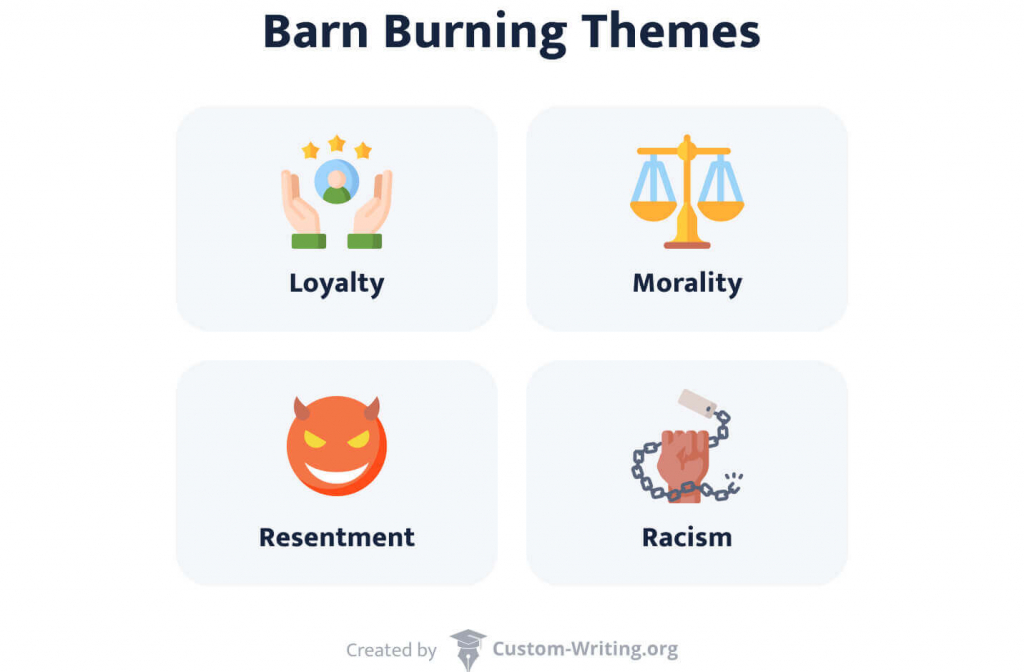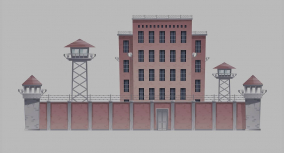“Barn Burning” is considered one of William Faulkner’s best works. In this short story, he traces traumatic events experienced by a young boy, Sartoris. “Barn Burning” centers around his family and father Abner, a poverty-stricken tenant farmer in the South. Because of Abner’s anger and resentment, Sarty is trapped between the loyalty to his family and his developing sense of justice.
This article explores four central “Barn Burning’s” themes: loyalty, morality, resentment, and racism.

Loyalty Theme in Barn Burning
In “Barn Burning”, Sartoris has to decide whether to stay loyal to his family and his father, Abner Snopes, or be faithful to his sense of justice and law. For Abner, family loyalty is paramount, and blood ties stand above everything. That’s why it the entire family is in conflict with the community they live in. Everyone who’s not family is perceived as an enemy.
There are multiple occasions in which blood appears in the story: as an invisible connection that serves as bondage for the main character and as blood in a literal sense. For instance, when Abner and his sons leave the court, Sartoris fights with a boy who offended his father. The blood on his face serves as a symbol of Sarty’s loyalty.
Throughout the story, Sarty’s sense of justice and morality develops, which allows him to break free from his abusive father. As the climax for this theme in “Barn Burning”, Sartoris tells De Spain about the fire: this way, he rejects Abner’s evil actions. Him running into the wood at the end of the story also serves as a metaphor of freedom from his father. As for the rest of his family, the connections are very shallow, which contributes to his decision to betray them.
Barn Burning Theme of Morality
In many ways, the two court proceedings and the two barns set on fire serve as unifying symbols of justice and morality in “Barn Burning”. Every character tries to pursue justice as they see it. Mr. Harris wants to punish Abner for the damaged property, De Spain intends to get 20 bushels of corn for the rug, Abner wants to punish the wealthy people for being wealthy, and Sarty wants his father to stop committing arson.
Quotes about Loyalty and Morality
He could not see the table where the Justice sat and before which his father and his father’s enemy (our enemy he thought in that despair; ourn! mine and hisn both! He’s my father!) stood, but he could hear them, the two of them that is, because his father had said no word yet.
Barn Burning, Sarty Snopes
He aims for me to lie, he thought, again with that frantic grief and despair. And I will have to do hit.
Barn Burning, Sarty Snopes
Again he could not see, whirling; there was a face in a red haze, moonlike, bigger than the full moon, the owner of it half again his size, he leaping in the red haze toward the face, feeling no blow, feeling no shock when his head struck the earth, scrabbling up and leaping again, feeling no blow this time either and tasting no blood, scrabbling up to see the other boy in full flight and himself already leaping into pursuit as his father’s hand jerked him back, the harsh, cold voice speaking above him: “Go get in the wagon.”
Barn Burning, Narrator
“You’re getting to be a man. You got to learn. You got to learn to stick to your own blood or you ain’t going to have any blood to stick to you. Do you think either of them, any man there this morning, would? Don’t you know all they wanted was a chance to get at me because they knew I had them beat? Eh?” Later, twenty years later, he was to tell himself, “If I had said they wanted only truth, justice, he would have hit me again.” But now he said nothing. He was not crying.
Barn Burning, Abner Snopes and Sarty Snopes
Racism in Barn Burning
In “Barn Burning”, William Faulkner writes about the American South during the post-Civil War period. The society in which the characters have to exist couldn’t be more socially and racially divided. Abner, the Snopes family’s father, is a poor farmer who works on the land owned by wealthy landowners. Even though he is white, which should give him economical and social privilege, his real situation is closer to that of ex-slaves. This makes Abner resentful and angry. He hates wealthy White people, but he also finds Black people inferior to him, which lays the foundation for the racism theme in “Barn Burning”.
Abner makes racist remarks when he talks about Black servants in Major de Spain’s house. Partially, this sense of white supremacy is passed to Sarty too. Racism is embedded deeply in the mind of every White character in the story.
As you already know, what makes Abner resentful and angry is that his financial situation is not much different from that of ex-slaves. However, he thinks that he is better than De Spain because he is not using “black labor.” Abner tries to teach Sarty about the injustices of the sharecropping system. In this new post-Civil War reality, the differences between “white” and “black” become more blurred. By using racist language, Abner tries to restore the old way of life.
Resentment Theme in Barn Burning
The society in which Sarty lives is rapidly changing. However, it is not easy to escape the cycle of poverty in which the Snopes are trapped. The class war which Abner takes on makes it even harder for the family to make their ends meet. The Snopes represent the old South as the era of Industrialization comes to change it.
Quotes about Resentment and Racism
He was a strange nigger. He said, ‘He say to tell you wood and hay kin burn.’ I said, ‘What?’ ‘That whut he say to tell you,’ the nigger said. ‘Wood and hay kin burn.’ That night my barn burned. I got the stock out but I lost the barn.
Barn Burning, Mr. Harris
People whose lives are a part of this peace and dignity are beyond his touch, he no more to them than a buzzing wasp: capable of stinging for a little moment but that’s all; the spell of this peace and dignity rendering even the barns and stable and cribs which belong to it impervious to the puny flames he might contrive . . .
Barn Burning, Narrator
The door opened so promptly that the boy knew the Negro must have been watching them all the time, an old man with neat grizzled hair, in a linen jacket, who stood barring the door with his body, saying, “Wipe yo foots, white man, fo you come in here. Major ain’t home nohow.”
Barn Burning, Narrator
His father spoke for the first time, his voice cold and harsh, level, without emphasis: “I aim to. I don’t figure to stay in a country among people who . . .” he said something unprintable and vile, addressed to no one.
Barn Burning, Abner Snopes
Now, you know all about themes in “Barn Burning”! If you’re looking for writing ideas for an essay about Faulkner’s story, check out our topics list.











